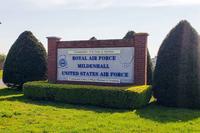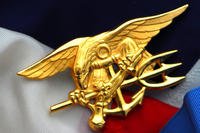JOINT BASE LANGLEY-EUSTIS, Va. -- The text on the page began to blend together as his eyes scanned the Washington Post, aimlessly jumping through the headlines.
Almost by accident, he found himself staring at three words he couldn't ignore: "One Year Later."
"Just look away," he thought. "Turn the page. You don't need to read about this."
Even as U.S. Army National Guard Chief Warrant Officer 2 Clifford Bauman tried to pull his gaze from the story, his mind took him back in time to a place and time he never wanted to see again.
Sept. 12, 2001 -- The Pentagon, Washington, D.C.
"There was stuff floating everywhere," Bauman said, as he described his journey through knee-deep water into the Pentagon's E-corridor. "We made our way back around between C and B-corridor and saw where the nose of the aircraft detached and shot through the building."
Immediately, the team stepped outside, set up equipment designed to locate active cell phones and went to work searching for signals.
"Once we started pinging I reentered the building, crawling," he said. "We were there all day and into the night, looking for people - eighteen hours and no survivors -- not one."
Looking back at what he did -- what he forced himself to do - Bauman said there was only one word to describe everything he experienced.
"Horrific," he said. "Seeing your fellow Soldiers, Airmen, Sailors and Marines lying dead in an area where you would think it was impossible was hard to deal with."
Even though Bauman had steeled himself to seeing the remains of fallen service members and comrades, he continued to work through the night, and the painful reality began to fester inside him like a cancerous wound.
"When I went home, I really didn't talk about it," he said. "I took my uniform off and threw it in the wash. I took my boots, gloves and hat off and stuck them in a box - they're still in that box to this day."
For Bauman, the shutdown was automatic. He would discuss general details, but never mention the bodies. He would never talk about the sights, sounds and smells from the flooded hallways and burned-out corridors that stayed buried deep inside his soul like a cancer, slowing eating away at him.
"I didn't talk about it," he said, quietly.
A year after he put those memories away, Bauman felt them bubble to the surface as he read the stories and personal accounts printed in the Washington Post. One particular article caught his eye: a letter, written by a son whose mother had died at the Pentagon.
"I had found her body when I was searching through the wreckage," he said, swallowing a lump in his throat.
From that moment, Bauman's life entered a downward spiral into darkness.
"I felt guilty," he said. "I wasn't able to find anyone alive. When I would go to sleep at night I would have vivid dreams about what I saw -- what I crawled through."
Nights were the worst, as Bauman was relentlessly tormented by his own memory. During the day, tired and exhausted from restless and intermittent sleep, Bauman tried to find solace at the bottom of a bottle.
"As you start going down that road, things change inside you," he said. "People started noticing there was something different about me, even though I didn't see it within myself."
The more differently people began to treat Bauman, the more stressed he became. That stress permeated every aspect of his life -- including relationships with his family.
"My family knew something was wrong," he said, "but I couldn't explain to them what was wrong. I couldn't express it."
This vicious cycle was propagated when those close to him tried desperately to reach out to Bauman, which only caused him to withdraw further from his family, friends and coworkers.
As time dragged on, Bauman withdrew more and more. He internalized his feelings and memories, lying to counselors and hiding the post-traumatic stress disorder he would later be diagnosed with. Weeks turned to months as Bauman said the stress and guilt he felt became "poison" in his veins.
"I didn't have an outlet for the stress I was feeling because I wasn't talking to my psychologist about how I truly felt," he said. "I just wanted to get the counseling over with because I was fearful for my military career."
With his days spent worrying over his future in the Army, and his nights spent in torment, Bauman decided he needed to get away for the Christmas season and returned home to Kansas City, Mo. Unfortunately, home was where he felt the entire weight of the world crash down upon him.
"To this day I have no idea what triggered it," Bauman said. "I was alone at my brother's house when an overwhelming sense of guilt came over me. Everything I had been dealing with just built up all at once, and I didn't want to deal with it anymore."
Life, Bauman said, had become too much for him to handle. Slowly, almost robotically, he penned a note on a napkin.
"I didn't want to live with the guilt of not finding anybody alive," he said. "I told everybody I loved them, then took 20 sleeping pills and laid on the couch."
Darkness enveloped Bauman as he prepared to close his eyes for the last time.
However, instead of emptiness and oblivion, Bauman began to see light enter his world again. Slowly and weakly, Bauman opened his eyes and found himself lying in a hospital bed a mile from where he tried to take his own life. As errant thoughts and unanswered questions ran through his mind, Bauman kept returning to one inescapable fact -- he had woken up alive.
"My brother was there," Bauman said. "He was a nurse who worked at the hospital about a mile from his house. After my brother tried to call and couldn't reach me, he started getting worried."
Bauman's brother left work and raced home.
"He found me, unconscious," Bauman said. "He threw me in a car and rushed me to the hospital."
As Bauman lay in his bed, taking in everything he had done to himself, he began to feel differently.
"I started feeling like a big weight had been lifted off me," he said. "At that point I realized what I was doing wasn't the right way to do things. I no longer cared about my career; I only cared about fixing what was wrong with me."
Three days after Bauman tried to take his own life, he was released from his mandated stay at the state mental facility. The psychiatrist at the facility, having helped Bauman open up and share more of his pain, communicated with the counselor in Virginia on the best road forward.
"I was honest at that point," Bauman said. "I went back into therapy and talked in detail about what I felt and why I felt that way."
At first, sharing his pain did not come naturally to Bauman.
"It was hard for me," he said. "My generation didn't talk about our problems -- that's how we were raised. Men just didn't do it."
Despite the difficulty, Bauman pushed forward, and almost immediately felt his world begin to change. He began opening up with his therapist, which led to a proper diagnosis and treatment of his PTSD. As his story flowed out, he began to feel that overwhelming pain and stress melt away.
"My life changed from night to day," he said. "It's still a process, though. It never really goes away, but you learn how to control the triggers that lead you down negative paths."
Now, 12 years after Sept. 11, 2001, Bauman stands a changed man. He has since advanced in rank to chief warrant officer 4 and is assigned as a warrant officer training specialist at U.S. Army Initial Military Training Center of Excellence at Fort Eustis, Va. A staunch supporter of the Army Comprehensive Soldier and Family Fitness (CSF2) program, he always looks for ways to help service members in need.
"I went through the CSF2 program in 2010," he said. "At the end of the course I told my story to the class. It was the first time I spoke publically about it."
Bauman said he told his story because he truly felt the techniques taught at CSF2 could be used to save someone from committing suicide.
"I'm a firm believer," he began. "Had I been taught those techniques, it might have kept me from going down the path I did."
After Bauman told his story, he said Soldiers who had gone through the class with him were shocked.
"I had six Soldiers come up to me," he said. "Two of them told me about their suicidal thoughts and attempts."
Their confessions floored Bauman.
"Their courage showed me, at that point," he said, "that no matter how hard or how painful it was for me, I had to tell Soldiers my story to convey the message that PTSD doesn't have to end your career."
Today, he proudly wears his uniform, and celebrates the two promotions he earned since that fateful day at the Pentagon. Neatly pressed and perfectly arranged, Bauman's uniform also boasts a small, unassuming ribbon that represents the highest non-combat award available -- the Soldier's Medal.
Bauman earned this distinction when he saved three men from drowning in Virginia's Chesapeake Bay, Oct. 3, 2009. He freely admits that none of it would have been possible had he not made the decision to take control of his life.
"It's okay to go and get help when you need it," Bauman said. "There are some things you just can't handle yourself. I understand what it means to get to that point where you think suicide is the answer. I've been there. I understand what it's like when you don't want to deal with the family anymore, to deal with the stress of trying to explain what you're going through. But suicide is not the answer."
Looking down, Bauman eyed a cloth bag sitting on the floor next to him. As if he saw it for the first time he reached inside and pulled out the boots, hat and gloves he wore when he crawled through the Pentagon. For the first time in more than a decade, Bauman ran his fingers along the smooth leather of the boot and the rough fabric of the gloves.
"It's hard," he said, as his hands trembled slightly. "Even after all this time, it's still hard to hold these."
Bauman sighed deeply and smiled broadly.
"But, I'm alright," he said, confidently. "I'm really alright."



























